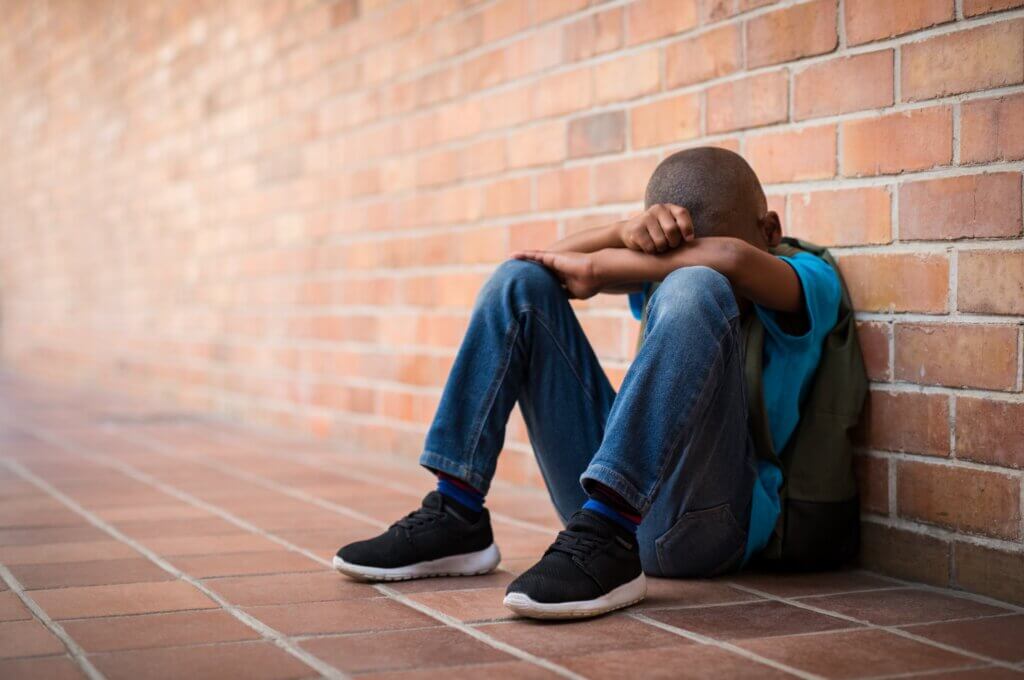7 Psychological Consequences of Suffering Discrimination

Discrimination is understood as the unfair treatment that’s given to a person due to classifying them into groups, classes, or general categories. For example, religion, weight, skin color, national origin, age, gender, or sexual orientation. Although there has been progress in this regard, it’s fair to say that it’s a latent problem in society. Let’s see what the psychological consequences of suffering discrimination are.
Discrimination can affect both a psychological and a physical level. Whoever’s the object of it can develop a series of behavior patterns to deal with its consequences. This translates into emotional, mental, and habit disorders. There are many psychological consequences of suffering discrimination, but today we’ll focus on the most significant ones.
Main psychological consequences of suffering discrimination
In its beginnings, the term discrimination was used to refer to the treatment that was received by a person in regard to their skin color. Today, its use has become widespread, so different qualities and characteristics can be used to manifest a discriminatory act. We compiled 7 psychological consequences of suffering discrimination according to what experts have to say.
1. Higher stress indices
As indicated by the American Psychological Association (APA), stress is among the first psychological consequences of suffering discrimination. Stress is a natural response that prepares the body to face a problem that threatens its integrity. It’s part of what’s known as the fight or flight response; that is, our tendency to flee and survive or stay and fight in the face of perceived danger.
Those who are subject to permanent discrimination show higher levels of stress. This is because your body is constantly on alert to either flee or stay and fight. Stress negatively affects general health, so the affected person will develop parallel consequences both physically and mentally.
2. Anxiety disorders
A study published in the Proceedings of the National Academy of Sciences in 2020 found that episodes of ongoing discrimination are a risk factor for the development of anxiety. Anxiety isn’t a single disorder, but rather a group of disorders. Obsessive-compulsive disorder, panic disorder, social anxiety disorder, and specific phobias are some of its manifestations.
Depending on the specific type of discrimination, persons who are exposed to discrimination may develop one of these disorders. All these manifestations share symptoms in common, such as exacerbated anxiety, pathological fear, excessive worry, feelings of restlessness, and difficulty concentrating. Severe cases can lead to chronic anxiety.
3. Episodes of depression

There’s also evidence that discriminatory behaviors and attitudes increase the chances of manifesting depressive signs in those affected. Depression is a very complex phenomenon, one that triggers a series of physical, emotional, and psychological reactions that completely disrupt a person’s well-being. Among many other things, it’s characterized by the following:
- Feelings of hopelessness
- Frustration and restlessness
- A vacuum sensation
- Pessimism, helplessness, and uselessness
- Reduced pleasure in activities that were previously enjoyed
- Social withdrawal
- Sleep disorders
- Fatigue, loss of energy, and permanent lethargy
Depression is mediated by chemical factors, so it’s not just about being sad. If the degree of discrimination that a person receives is moderate or severe, it’s not uncommon for episodes of this type to occur. The most severe cases can be associated with suicidal thoughts and even attempts to materialize these thoughts.
4. Lower self-esteem
Studies and research have associated perceived discrimination with a negative impact on overall self-esteem. Self-esteem is the subjective perception that a person has about themself.
Discriminatory comments, teasing, incidents, and encounters can alter this perception. In this case, it does so negatively, and its starting point is criticism and prejudice from the outside.
Low self-esteem is a problem that continues to be invisible. Its consequences can be very severe, for example, suicidal behaviors, personality disorders, addictions, and episodes of depression and anxiety. It’s built based on the person’s relationship with the environment, so it’s natural that it’s affected in the process.
5. Permanent trauma
At the same time, some researchers have found that discriminatory events can leave enough scars to cause trauma.
This is one of the psychological consequences of suffering discrimination that can last for decades, and it does so in the form of post-traumatic stress disorder. Some of the ways that trauma can manifest are through nightmares, flashbacks, and a lack of positive emotions.
6. Eating disorders

Eating disorders appear specifically in discriminatory events related to weight or physical appearance. For example, those who are obese or overweight, those who lack sufficient muscle mass, or those who are very thin.
These individuals are prone to developing anorexia nervosa, bulimia nervosa, binge eating disorder, and avoidant and restricted eating disorder. Vigorexia may also be associated with these events.
7. Lower perception of general psychological well-being
Finally, people exposed to situations of this type report reduced general psychological well-being. A person’s psychological well-being mediates their general satisfaction with life, so someone who’s affected by discrimination will go through a process of destruction and alienation.
The impact will be seen on an emotional level, but also in the way in which they manage their day-to-day life, relate to others, plan actions for the future, and interpret their reality.
The psychological consequences of suffering discrimination don’t go unnoticed at all, and they always affect individuals on a negative level. It’s for this reason that stopping events of this type is a social and public objective, as its repercussions are widely felt in society.
Progress has been made in legal matters so that today it’s possible to report discriminatory events to competent authorities. Do so if necessary and seek professional help if you’ve manifested any of these sequelae.
Discrimination is understood as the unfair treatment that’s given to a person due to classifying them into groups, classes, or general categories. For example, religion, weight, skin color, national origin, age, gender, or sexual orientation. Although there has been progress in this regard, it’s fair to say that it’s a latent problem in society. Let’s see what the psychological consequences of suffering discrimination are.
Discrimination can affect both a psychological and a physical level. Whoever’s the object of it can develop a series of behavior patterns to deal with its consequences. This translates into emotional, mental, and habit disorders. There are many psychological consequences of suffering discrimination, but today we’ll focus on the most significant ones.
Main psychological consequences of suffering discrimination
In its beginnings, the term discrimination was used to refer to the treatment that was received by a person in regard to their skin color. Today, its use has become widespread, so different qualities and characteristics can be used to manifest a discriminatory act. We compiled 7 psychological consequences of suffering discrimination according to what experts have to say.
1. Higher stress indices
As indicated by the American Psychological Association (APA), stress is among the first psychological consequences of suffering discrimination. Stress is a natural response that prepares the body to face a problem that threatens its integrity. It’s part of what’s known as the fight or flight response; that is, our tendency to flee and survive or stay and fight in the face of perceived danger.
Those who are subject to permanent discrimination show higher levels of stress. This is because your body is constantly on alert to either flee or stay and fight. Stress negatively affects general health, so the affected person will develop parallel consequences both physically and mentally.
2. Anxiety disorders
A study published in the Proceedings of the National Academy of Sciences in 2020 found that episodes of ongoing discrimination are a risk factor for the development of anxiety. Anxiety isn’t a single disorder, but rather a group of disorders. Obsessive-compulsive disorder, panic disorder, social anxiety disorder, and specific phobias are some of its manifestations.
Depending on the specific type of discrimination, persons who are exposed to discrimination may develop one of these disorders. All these manifestations share symptoms in common, such as exacerbated anxiety, pathological fear, excessive worry, feelings of restlessness, and difficulty concentrating. Severe cases can lead to chronic anxiety.
3. Episodes of depression

There’s also evidence that discriminatory behaviors and attitudes increase the chances of manifesting depressive signs in those affected. Depression is a very complex phenomenon, one that triggers a series of physical, emotional, and psychological reactions that completely disrupt a person’s well-being. Among many other things, it’s characterized by the following:
- Feelings of hopelessness
- Frustration and restlessness
- A vacuum sensation
- Pessimism, helplessness, and uselessness
- Reduced pleasure in activities that were previously enjoyed
- Social withdrawal
- Sleep disorders
- Fatigue, loss of energy, and permanent lethargy
Depression is mediated by chemical factors, so it’s not just about being sad. If the degree of discrimination that a person receives is moderate or severe, it’s not uncommon for episodes of this type to occur. The most severe cases can be associated with suicidal thoughts and even attempts to materialize these thoughts.
4. Lower self-esteem
Studies and research have associated perceived discrimination with a negative impact on overall self-esteem. Self-esteem is the subjective perception that a person has about themself.
Discriminatory comments, teasing, incidents, and encounters can alter this perception. In this case, it does so negatively, and its starting point is criticism and prejudice from the outside.
Low self-esteem is a problem that continues to be invisible. Its consequences can be very severe, for example, suicidal behaviors, personality disorders, addictions, and episodes of depression and anxiety. It’s built based on the person’s relationship with the environment, so it’s natural that it’s affected in the process.
5. Permanent trauma
At the same time, some researchers have found that discriminatory events can leave enough scars to cause trauma.
This is one of the psychological consequences of suffering discrimination that can last for decades, and it does so in the form of post-traumatic stress disorder. Some of the ways that trauma can manifest are through nightmares, flashbacks, and a lack of positive emotions.
6. Eating disorders

Eating disorders appear specifically in discriminatory events related to weight or physical appearance. For example, those who are obese or overweight, those who lack sufficient muscle mass, or those who are very thin.
These individuals are prone to developing anorexia nervosa, bulimia nervosa, binge eating disorder, and avoidant and restricted eating disorder. Vigorexia may also be associated with these events.
7. Lower perception of general psychological well-being
Finally, people exposed to situations of this type report reduced general psychological well-being. A person’s psychological well-being mediates their general satisfaction with life, so someone who’s affected by discrimination will go through a process of destruction and alienation.
The impact will be seen on an emotional level, but also in the way in which they manage their day-to-day life, relate to others, plan actions for the future, and interpret their reality.
The psychological consequences of suffering discrimination don’t go unnoticed at all, and they always affect individuals on a negative level. It’s for this reason that stopping events of this type is a social and public objective, as its repercussions are widely felt in society.
Progress has been made in legal matters so that today it’s possible to report discriminatory events to competent authorities. Do so if necessary and seek professional help if you’ve manifested any of these sequelae.
- Britt-Spells AM, Slebodnik M, Sands LP, Rollock D. Effects of Perceived Discrimination on Depressive Symptoms Among Black Men Residing in the United States: A Meta-Analysis. Am J Mens Health. 2018;12(1):52-63.
- Cuevas AG, Mann FD, Williams DR, Krueger RF. Discrimination and anxiety: Using multiple polygenic scores to control for genetic liability. Proc Natl Acad Sci U S A. 2021;118(1):e2017224118.
- Espinosa A. Discrimination, Self-Esteem, and Mental Health Across Ethnic Groups of Second-Generation Immigrant Adolescents. J Racial Ethn Health Disparities. 2021 Dec;8(6):1539-1550.
- Panchanadeswaran S, Dawson BA. How discrimination and stress affects self-esteem among Dominican immigrant women: an exploratory study. Soc Work Public Health. 2011;26(1):60-77.
- Polanco-Roman L, Danies A, Anglin DM. Racial discrimination as race-based trauma, coping strategies, and dissociative symptoms among emerging adults. Psychol Trauma. 2016;8(5):609-617.
Este texto se ofrece únicamente con propósitos informativos y no reemplaza la consulta con un profesional. Ante dudas, consulta a tu especialista.







